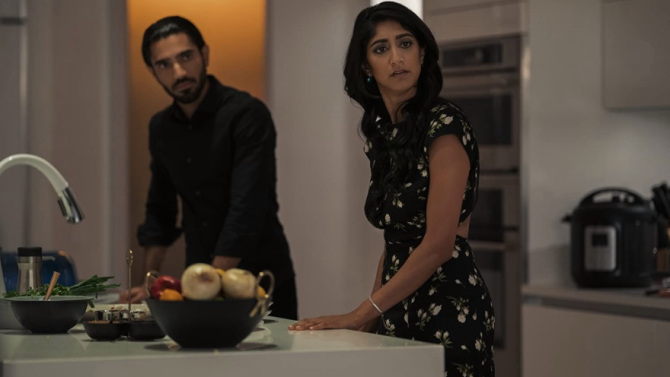
Growing up, the mal ojo was something that was always talked about. If you complimented someone’s hair or clothes, you had to touch them to stop the ojo from spreading to them, from your jealousy affecting their blessings. When I would stumble and drop my fries, my immediate reaction was to tell my brother that he gave me the ojo. And of course, you never told anyone of your successes until the ink was dry, lest the mal ojo rip them away from you. While I’m Mexican, the concept of the mal ojo, or the Evil Eye has roots in many traditions across the world. But it was my connection to it that drew me into this week’s “Welcome to the Blumhouse” installment: Evil Eye.
But while my examples of the mal ojo to open this review are trivial, the impact of the evil eye in this film is felt across generations. Based on the award-winning, best-selling Audible Original production from writer Madhuri Shekar, Evil Eye is directed by Elan Dassani and Rajeev Dassani and stars Sarita Choudhury, Sunita Mani, Omar Maskati, and Bernard White. In the film, a seemingly perfect romance between Pallavi (Sunita Mani) and her boyfriend Sandeep (Omar Maskati) turns into a nightmare.
Initially, Pallavi’s mother Usha (Sarita Choudhury) is pushing her daughter towards marriage, even setting her up with a man who is just visiting her city. But when Pallavi meets seemingly perfect Sandeep and quickly begins a relationship moving at breakneck speed, her mother becomes convinced that Sandeep is really the reincarnation of a dangerous man from her past. With the fear of Sandeep hurting her daughter the way the man in his body hurt her, Usha does everything she can to try to speak across the generational divide and save her daughter before it’s too late.
“Welcome to the Blumhouse” is a collaborative effort between Amazon Studios and Blumhouse which has produced four films in the anthology format. Connected through the concept of family, each one of these films has delved into the lengths that parents will go to for their children and how these relationships are formed, neglected, or stretched to their limit. That said, Evil Eye is a film that doesn’t look to showcase the way that parental bonds can warp to harm others like The Lie or Black Box, but instead focuses on how a mother’s love has to speak across the generational divide, superstition, to protect her child.

In the film, Usha has returned to Delhi, keeping in touch with her daughter in New Orleans through phone calls. From the start, there is a gap between the two of them. Usha wants Pallavi to get married, be taken care of by her husband, and secure her future that way. Pallavi wants to keep control of her own life and isn’t concerned in matching with a nice Indian boy from a good family. Instead, she’s focused on work and becoming a writer. But when she meets Sandeep, this changes and Pallavi lets him provide for her, and even quits her job under the guise of pursuing her dream. It’s then that the alarm bells start to ring for Usha as she sees her daughter giving up her independence and her power in the relationship. Having survived abuse, we begin to see how traditional beliefs quickly fade from Usha’s mind when she begins to see her daughter beholden to a man she barely knows.
However, from Pallavi’s position, her mother is giving in to superstitions and ultimately she can’t understand her mother’s issues with Sandeep. To Pallavi, she’s finally meeting her mother’s expectations. She’s settling down with a man with money and a future, and who she loves. The core of the film is watching Usha find a way to reach her daughter from across the world. This involves Usha allowing herself to be vulnerable in front of her daughter, revealing the abuse of her past, and trying to warn her daughter of the red flags that signal a man beginning to control you.
Usha’s protection is passed down through her trauma. She can only teach her daughter what she knows, but she can only do so when she confronts it head-on and learns that it was never her fault. This is the key element of the film that solidifies its narrative success. While we get some thrilling moments, it’s Usha’s confrontation of her own guilt and the film’s closing lines that bring the moral of the story home. It wasn’t Usha’s fault. It wasn’t Pallavi’s fault. And it will never be another woman’s fault.
Overall, Evil Eye is bound to resonate with women who have lived through interpersonal violence, but also those who come from families where their trauma isn’t the only one. The film stands as a one that is capable to be a bonding tool between generations, especially for those from immigrant families.
Abuse as a narrative tool can be hard to integrate into a story, but in Evil Eye it just works. It’s a powerful vehicle for exploring the bond between mother and daughter that explores how trauma can be passed down, but also how it can be healed between generations of women. Sometimes, a mother can’t protect their daughter from pain, but they can teach them how to survive it, how to thrive after it, and to know it wasn’t their fault.
Evil Eye is now streaming exclusively on Amazon Prime.
Evil Eye
-
Rating - 8.5/108.5/10
TL;DR
Overall, Evil Eye is bound to resonate with women who have lived through interpersonal violence, but also those who come from families where their trauma isn’t the only one. The film stands as a one that is capable to be a bonding tool between generations, especially for those from immigrant families.






